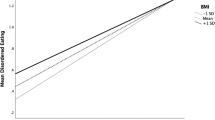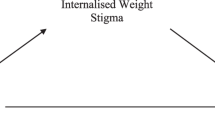Abstract
Background/objectives
Obesity has been declared a disease by the American and Canadian Medical Associations. Although these declarations sparked much debate as to the impact of framing obesity as a disease on weight bias, strong empirical research is needed to examine this impact. The current study examined the impact of framing obesity a disease on weight bias, focusing on moderating and mediating processes.
Subjects/methods
A sample of 309 participants living in the United States or Canada was recruited from Crowdflower. Participants completed measures of demographics, ideology, general attitudes, and previous contact quality and quantity with people living with obesity. Participants then read one of three articles as part of an experimental manipulation framing obesity as a disease, obesity not as a disease, and a control article unrelated to obesity. Post-manipulation included measures of affect, disgust, empathy, blame, and weight bias.
Results
Orthogonal contrasts were used to compare the obesity-disease condition to the obesity-not-disease condition and control condition. The manipulation had a direct effect on affect (emotions), such that affect toward individuals with obesity was more positive in the obesity-disease condition than the obesity-not-disease and control condition combined. Exploration of moderating effects revealed that both the belief in a just world and weight satisfaction moderated the relationship between the obesity-disease manipulation and blame for obesity. Two models of indirect effects on weight bias were also examined, which demonstrated that the obesity-disease manipulation predicted less weight bias through more positive affect (model 1) as well as less weight bias through decreased blame among individuals high in belief in a just world (model 2).
Conclusions
This study further highlights the complex effects of declaring obesity a disease, uncovering a new direction for future research into the role of affect as well as indirect effects of characterising obesity a disease on weight bias.
This is a preview of subscription content, access via your institution
Access options
Subscribe to this journal
Receive 12 print issues and online access
$259.00 per year
only $21.58 per issue
Buy this article
- Purchase on Springer Link
- Instant access to full article PDF
Prices may be subject to local taxes which are calculated during checkout

Similar content being viewed by others
Notes
A disproportionate number of participants in the obesity-not-disease condition failed the attention check. These participants may have misremembered the article as stating obesity as a disease given the other health-relevant information present or may have misread the article. No differences were found between groups on gender, BMI, age, highest level of education, or satisfaction with body weight or shape
References
Rich P. CMA recognizes obesity as a disease. 2015. https://www.cma.ca/En/Pages/cma-recognizes-obesity-as-a-disease.aspx. Accessed on 02 March 2016.
Frellick M. AMA declares obesity a disease. 2013. https://www.medscape.com/viewarticle/806566. Accessed on 02 March 2016.
Kabat G. Why labeling obesity as a disease is a big mistake. 2013. https://www.forbes.com/sites/geoffreykabat/2013/07/09/why-labeling-obesity-as-a-disease-is-a-big-mistake/#1af58ad0103b. Accessed on 02 March 2016.
Tanner M. Obesity is not a disease. 2013. https://www.nationalreview.com/2013/07/obesity-not-disease-michael-tanner/. Accessed on 02 March 2016.
Kahan S, Zvenyach T. Obesity as a disease: current policies and implications for the future. Curr Obes Rep. 2016;5:291–7.
Puhl RM, Liu S. A national survey of public views about the classification of obesity as a disease. Obesity (Silver Spring). 2015;23:1288–95.
Carels RA, Latner J. Weight stigma and eating behaviors. An introduction to the special issue. Appetite. 2016;102:1–2.
Andreyeva T, Puhl RM, Brownell KD. Changes in perceived weight discrimination among Americans, 1995-1996 through 2004-2006. Obesity (Silver Spring). 2008;16:1129–34.
Sabin JA, Marini M, Nosek BA. Implicit and explicit anti-fat bias among a large sample of medical doctors by BMI, race/ethnicity and gender. PLoS ONE. 2012;7:e48448.
Poon MY, Tarrant M. Obesity: attitudes of undergraduate student nurses and registered nurses. J Clin Nurs. 2009;18:2355–65.
Diversi TM, Hughes R, Burke KJ. The prevalence and practice impact of weight bias amongst Australian dietitians. Obes Sci Prac. 2016;2:456–65.
Cavaleri R, Short T, Karunaratne S, Chipchase LS. Weight stigmatization in physiotherapy: a systematic review. Phys Ther Rev. 2016;21:1–9.
Stevens SD, Herbozo S, Morrell HE, Schaefer LM, Thompson JK. Adult and childhood weight influence body image and depression through weight stigmatization. J Health Psychol. 2017;22:1084–93.
Sutin AR,Stephan Y,Terracciano A, Weight discrimination and risk of mortality. Psychol Sci. 2015;26:1803–11.
Crandall R, Reser A. Attributions and weight-based prejudice. In: Brownell K, Puhl R, Schwartz M, Rudd L, editors. Weight bias: Nature, consequences and remedies. New York: Guildford Press; 2005.
Hoyt CL, Burnette JL, Auster-Gussman L, Blodorn A, Major B. The obesity stigma asymmetry model: The indirect and divergent effects of blame and changeability beliefs on antifat prejudice. Stigma & Health. 2016;2:53–65.
Ebneter DS, Latner JD, O’Brien KS. Just-world beliefs, causal beliefs, and acquaintance: Associations with stigma toward eating disorders and obesity. Person Individ Differ. 2011;51:618–22.
Elison ZM, Çiftçi A. Digesting antifat attitudes: Locus of control and social dominance orientation. Transl Iss Psychol Sci. 2015;1:262–70.
O’Brien KS, Latner JD, Ebneter D, Hunter JA. Obesity discrimination: the role of physical appearance, personal ideology, and anti-fat prejudice. Int J Obes (Lond). 2013;37:455–60.
Jackson LE, Gaertner L. Mechanisms of moral disengagement and their differential use by right‐wing authoritarianism and social dominance orientation in support of war. Aggress Behav. 2010;36:238–50.
Hafer CL, Sutton R. Belief in a just world. In: CSMe Sabbagh, editor. Handbook of social justice theory and research. New York, NY, USA: Springer; 2016. p. 145–60.
Magallares A. Right wing autoritharism, social dominance orientation, controllability of the weight and their relationship with antifat attitudes. Univ Psychol. 2014;13:771–9.
Koball AM, Carels RA. Intergroup contact and weight bias reduction. Transl Iss Psychol Sci. 2015;1:298–306.
Kushner RF, Zeiss DM, Feinglass JM, Yelen M. An obesity educational intervention for medical students addressing weight bias and communication skills using standardized patients. BMC Med Educ. 2014;14:53.
Cottrell CA, Neuberg SL. Different emotional reactions to different groups: a sociofunctional threat-based approach to “prejudice”. J Pers Soc Psychol. 2005;88:770–89.
Buhrmester M, Kwang T, Gosling SD. Amazon’s mechanical turk: a new source of inexpensive, yet high quality, data? Perspect Psychol Sci. 2011;6:3–5.
Faul F, Erdfelder E, Lang AG, Buchner A. G*Power 3: a flexible statistical power analysis program for the social, behavioral, and biomedical sciences. Behav Res Methods. 2007;39:175–91.
Funke F. The dimensionality of right-wing authoritarianism: Lessons from the dilemma between theory and measurement. Polit Psychol. 2005;26:195–218.
Pratto F, Cidam A, Stewart AL, Zeineddine FB, Aranda M, Aiello A, et al. Social dominance in context and in individuals: Contextual moderation of robust effects of social dominance orientation in 15 languages and 20 countries. Soc Psychol Personal Sci. 2013;4:587–99.
Dalbert C, Montada L, Schmitt M. Glaube an eine gerechte Welt als Motiv: validierungskorrelate zweier Skalen [Belief in a just world: validation correlates of two scales]. Psychol Beitrage. 1987;29:596–615.
MacInnis CC, Hodson G. Intergroup bias towards “group x”: Evidence of prejudice, dehumanization, avoidance, and discrimination against asexuals. Group Proc Inter Relat. 2012;15:725–43.
Islam MR, Hewstone M. Dimensions of contact as predictors of intergroup anxiety, perceived outgroup variability, and outgroup attitude: An integrative model. Personal Social Psychol Bull. 1993;19:700–10.
Brochu P. Weight prejudice and medical policy: support for an ambiguously discriminatory policy is influenced by prejudice-colored glasses. Anal Soc Iss Public Policy. 2009;9:117–33.
Batson CD, Polycarpou MP, Harmon-Jones E, Imhoff HJ, Mitchener EC, Bednar LL, et al. Empathy and attitudes: can feeling for a member of a stigmatized group improve feelings toward the group? J Pers Soc Psychol. 1997;72:105–18.
Weiner B. Judgments of responsibility: a foundation for a theory of social conduct.. New York, NY, USA: Guilford; 1995.
Latner JD, O’Brien KS, Durso LE, Brinkman LA, MacDonald T. Weighing obesity stigma: the relative strength of different forms of bias. Int J Obes (Lond). 2008;32:1145–52.
Rosnow RL, Rosenthal R, Rubin DB. Contrasts and correlations in effect-size estimation. Psychol Sci. 2000;11:446–53.
Hayes AF. An introduction to mediation, moderation, and conditional process analysis: a regression-based approach. New York, NY, USA: Guilford; 2013.
Haslam N, Kvaale EP. Biogenetic explanations of mental disorder: the mixed blessings model. Curr Dir Psychol Sci. 2015;24:399–404.
Tropp LR, Pettigrew TF. Differential relationships between intergroup contact and affective and cognitive dimensions of prejudice. Pers Soc Psychol Bull. 2005;31:1145–58.
Pettigrew TF, Tropp LR. A meta-analytic test of intergroup contact theory. J Pers Soc Psychol. 2006;90:751–83.
Ellard JH, Harvey A, Callan MJ. The justice motive: history, theory, and research. ICSMS, editor. Handbook of social justice theory and research. New York, NY, USA: Springer-Verlag; 2016. p. 127–43.
Hodson G, Costello K, MacInnis CC. Is intergroup contact beneficial among intolerant people? Exploring individual differences in the benefits of contact on attitudes. In Hodson G, Hewstone M, editors. Advances in intergroup contact. New York, NY, US: Psychology Press; 2013. p. 49–80.
Alberga AS, Russell-Mayhew S, von Ranson KM, McLaren L, Ramos Salas X, Sharma AM. Future research in weight bias: What next? Obesity (Silver Spring). 2016;24:1207–9.
Acknowledgements
SN is currently funded by a Doctoral Research Award from the Social Sciences and Humanities Research Council. ASA was previously funded by a Banting Postdoctoral Fellowship Award from the Canadian Institutes of Health Research at the University of Calgary and is currently supported by a Research Scholar Junior 1 Award from les Fonds de Recherche du Québec- Santé at Concordia University, Montreal. This research was funded by a University of Calgary Research Grants Council Grant.
Author information
Authors and Affiliations
Corresponding author
Ethics declarations
Conflict of interest
The authors declare that they have no conflict of interest.
Electronic supplementary material
Rights and permissions
About this article
Cite this article
Nutter, S., Alberga, A.S., MacInnis, C. et al. Framing obesity a disease: Indirect effects of affect and controllability beliefs on weight bias. Int J Obes 42, 1804–1811 (2018). https://doi.org/10.1038/s41366-018-0110-5
Received:
Revised:
Accepted:
Published:
Issue Date:
DOI: https://doi.org/10.1038/s41366-018-0110-5
This article is cited by
-
Who’s a good boy? Effects of dog and owner body weight on veterinarian perceptions and treatment recommendations
International Journal of Obesity (2020)



